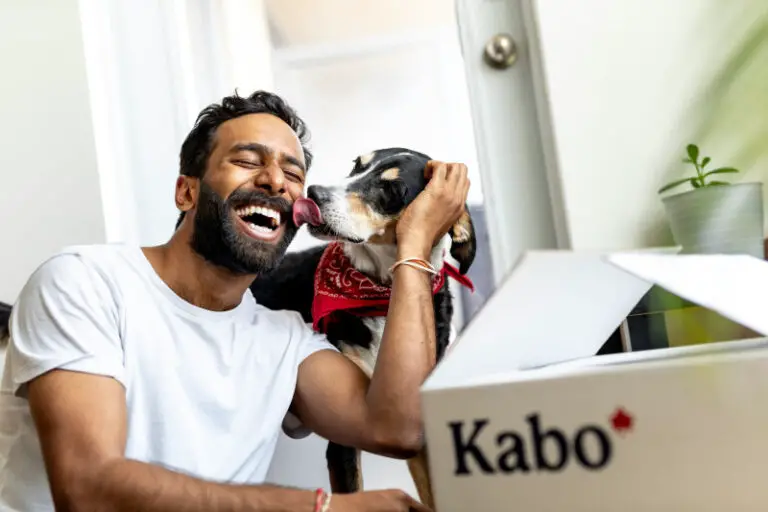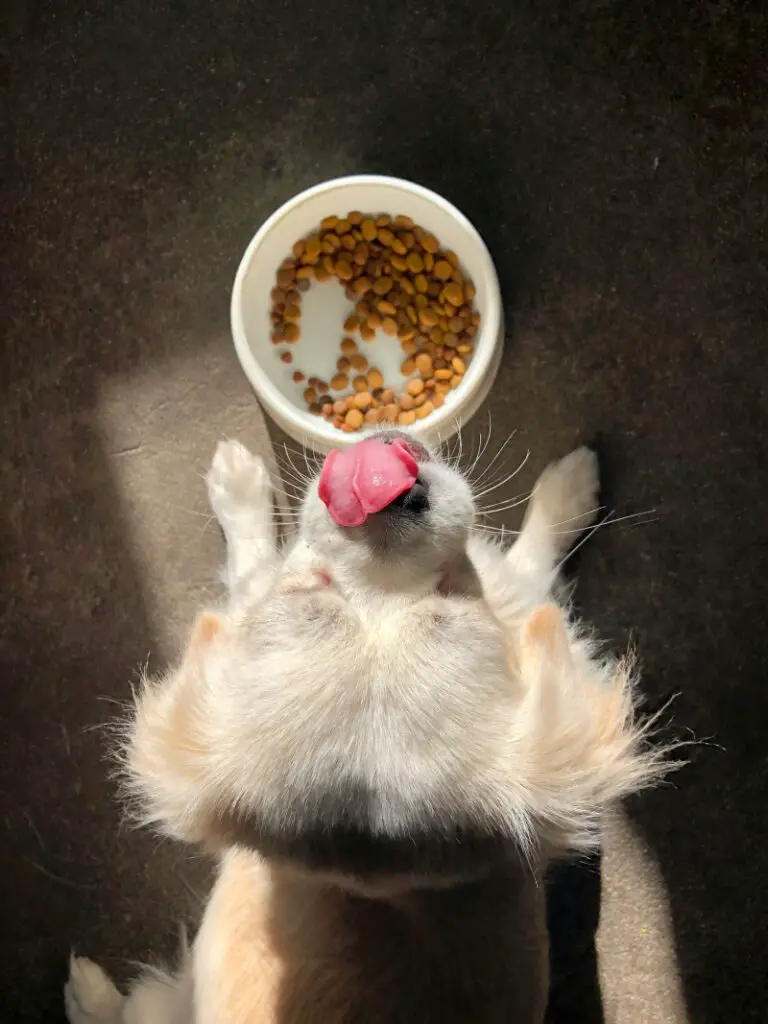As an owner, you probably already know that there are some vegetables that are recommended for dogs and others that should be avoided. One of the most common vegetables in our homes is the carrot, not only because of its flavor and nutritional value but also because of its low cost and versatility. It is normal for many people to ask themselves: “Can I give my dog carrots?”
Read on below to find out if dogs can eat carrots, what would be the proper preparation method, what portion size is recommended, and what to do to avoid unwanted effects.
Table of Contents
Can a dog be given a carrot?
Definitely yes. Dogs can eat carrots as part of their regular diet. It is a natural, nutritious, and most importantly safe food for the animal. In fact, many experts recommend it as one of the best treats to train and reward good behavior in your pet.
If you are one of the owners interested in reducing the consumption of commercial products and prefer to enhance your dog’s diet with other alternatives, consider that carrots are an option loaded with nutrients, but at the same time low in calories.
As if that were not enough, dogs find it a very appetizing food.
As long as it is given in moderation, carrots are a highly recommended vegetable for adult dogs and puppies. More and more commercial foods and sweets include carrots among their ingredients.
Note. Later in this article, you will see information on the forms of consumption and the number of carrots suitable for dogs.
Carrot benefits: why is it good for your dog?
Carrot is not only suitable for consumption in dogs, but it can also offer several health benefits. In this case, the pet can benefit from the same nutritional properties as its owner.
Due to its high concentration of vitamins, minerals, antioxidants, and fiber, the popular tuberous vegetable helps promote good canine health.
Carrot Nutritional Information
100 grams of raw carrot provide approximately:
- Carbs – 9.6g
- Dietary fiber – 2.8 g
- Fats – 0.2g
- Proteins – 0.9 g
- Calories – 41
In addition, it provides significant amounts of vitamin A, vitamin C, vitamin K, vitamin B6, folate, potassium, manganese, phosphorus, and calcium.
According to different sources, carrot is good for:
1. Protect the dog’s eye health
Carrots are very high in vitamin A, a nutrient linked to good vision and general eye health. A dog that eats carrots on a regular basis has a lower risk of experiencing eye problems.
In fact, it is said that not getting enough vitamin A can lead to infections and even vision loss.
Did you know…? Vitamin A is considered an essential nutrient in the canine world, which is why it is a required additive in commercial dog foods. As a result, it is rare to see a dog with a vitamin A deficiency.
It may interest you: Corneal Ulcer in Dogs – 7 Causes, Types, Symptoms, Treatment, and More
2. Promote regular bowel movements
The high content of soluble fiber in carrots helps increase the volume of feces, promotes regular bowel movements, and supports the dog’s digestive and intestinal function. This can be especially beneficial for dogs with diarrhea or loose stools.
3. Support canine dental health and hygiene
Carrot is a great ally to prevent and combat dental tartar in dogs. Many veterinarians recommend daily brushing, but this is not always easy to achieve; some dogs just can’t stand it.
In that case, it is recommended to give them carrots, because their hard consistency helps to clean their teeth and reduces the accumulation of plaque. This is useful in both young and adult dogs, as well as puppies during teething. Frozen carrot is usually effective in relieving discomfort at this stage.
Mechanical denture scaling and gum massage are natural ways to protect canine oral health.
4. Strengthen the immune system
Like the vast majority of fruits and vegetables, carrots are a rich source of essential micronutrients and antioxidant compounds, which together, strengthen immune function and provide protection against common infections/diseases.
Here vitamins A, K, C, and B6, minerals such as potassium, manganese, calcium, and antioxidants such as alpha-carotene and beta-carotene stand out.
Although the usual portion of carrot does not meet the total vitamin needs of the dog, its addition to the diet is a good nutritional supplement.
5. Avoid overweight in dogs
Carrots are high in fiber, very low in calories, and have practically zero fat content. This makes it a great vegetable to use as a snack or crunchy treat. Unlike some commercial foods and treats, carrots are unlikely to make you fat.
Many veterinarians and nutritionists recommend it as an alternative for dogs who are overweight or have diabetes.
The 5 healthy benefits of carrots for dogs are:
-
Prevention of tartar or dental plaque
-
Eye health protection
-
Improved digestion and intestinal function
-
Strengthening of the immune system
-
Prevention of canine overweight
How to give carrots to dogs? Should they eat it raw or cooked?
Dogs can eat carrots as a snack, reward during training, or as an addition to the usual diet to increase the supply of nutrients. Carrot can be raw, frozen, or lightly cooked. In any case, the most important thing is to pay attention to the size of the pieces and control the amount ingested.
What is better for dogs, raw carrots or cooked carrots? The reality is that there is some debate about it.
On the one hand, there are those who advocate raw carrot, based on the fact that it is usually more effective in fighting dental plaque. Although a dog may occasionally eat small raw pieces, this is not considered the ideal form of consumption.
Most experts and veterinarians do not recommend giving raw carrots to dogs due to their difficult digestion. It has been observed that these animals tend to excrete the partially digested or undigested pieces, hence they are unable to take full advantage of the nutritional benefits.
As explained, lightly steamed carrot is the most suitable form of consumption. This not only allows for greater nutrient absorption but also enhances its flavor.
Ultimately, it is always recommended to seek the opinion of a trusted veterinarian, as well as pay attention to your pet and their preferences.
Did you know…? Raw carrots contain cellulose, a compound that dogs cannot digest.
How many carrots can a dog eat a day?
No matter how healthy a food is, moderation is key.
When it comes to dogs and carrots, the first thing to keep in mind is that their digestive systems don’t tolerate too many carrots well. Although this vegetable can be part of your daily meals, the administration should be moderate.
The amount of carrots that a dog can eat per day varies according to its size. For example, breeds like the German Shepherd or the Great Dane may digest larger portions of carrot than is appropriate for a small dog like the Maltese.
In general, it is said that average-sized dogs can eat 1 small carrot or the equivalent amount of 2-3 baby carrots each day. This amount will need to be adjusted depending on how tiny the dog is. Consider that the portion ingested should never represent more than 10% of the daily calories ingested by the pet.
Dogs and cats are carnivores by nature. High carbohydrate/fiber content in your diet can affect the functioning of the gastrointestinal system. Although the addition of vegetables is considered beneficial, an owner should always pay attention.
If your dog shows signs of upset stomach, constipation, or diarrhea after eating carrots, it’s best to discontinue this vegetable.
To be on the safe side, start with 3-4 thin slices, avoiding giving more than half of 1 carrot a day for more than 3 days a week.
Note. Seasoning carrots for dogs is not recommended; avoid adding salt, spices, or butter. The vegetables should be cut into small pieces so that they are safe to swallow whole.
5 helpful tips to keep in mind
- Before giving a carrot to your dog, be sure to wash and/or peel it to remove any remaining dirt or pesticides.
- Cut the carrot into easily chewable pieces for the pet. Pieces that are too large can cause a choking hazard, especially in puppies and small dogs.
- Whenever possible, choose to cut and manage pieces of the whole traditional carrot. Although many owners prefer to use baby carrots for convenience, their shape makes them more likely to slip and get stuck in the animal’s throat.
- In case of preparing the cooked carrot, avoid long periods of cooking, as this can result in the loss of nutrients. Instead of boiling, it is best to steam them. Make sure the pieces are completely cool inside and out before giving them to your pet.
- Consult the veterinarian about the inclusion of carrots in your dog’s diet. As with any other human food, it’s always a good idea to get a professional’s opinion about the method of preparation, the proper serving size, and any potential drawbacks to your health.
Recommended: The 11 Smallest Dog Breeds in the World [+Photos and Description]
Recipes: Carrot dog treats
1. Carrot, oatmeal, and apple cookies
Ingredients
- ½ cup whole grain steel-cut oats (works better than instant oats)
- ½ cup unsweetened applesauce
- ½ cup finely grated carrot
Instructions
- Add ingredients to a medium bowl and combine until smooth. Let’s stand for about 5 minutes.
- Meanwhile, preheat the oven to 350°F and line a baking sheet with parchment paper.
- After the resting time, use a spoon to scoop up portions of the mixture and form small cookies. If you prefer, you can shape it with the help of a mold you have at home (heart, star, bone).
- Place the cookies on the tray and bake for 18-20 minutes. Remove the treats from the oven and let them cool. Once cool, store them in a glass jar with a lid. They can last in the refrigerator for up to 5-7 days.
2. Peanut Butter Carrot Soft Treats
Ingredients
- 1 cup of natural and creamy peanut butter (without sugar or salt)
- 1 large grated carrot
- ¾ cup skim milk
- 1 large egg
- 1/3 cup instant oatmeal
Instructions
- Preheat the oven to 325°F and prepare a baking sheet.
- In a wide bowl, start by mixing the egg, milk, and peanut butter. Then add the oatmeal and grated carrot. The objective is to obtain a mixed and thick dough.
- Next, take small portions to give them the desired shape (flat, puffy, elongated cookies).
- Once organized on the tray, take it to the oven for only 15 minutes. Flip the treats over and bake for an additional 10 minutes.
- Remove them from the oven and let them cool completely before giving them to your dog. You can store them at room temperature or in the refrigerator for up to 1 week.
Contraindications and warnings: when is it not safe for a dog to eat carrots?
Although the carrot is considered a safe vegetable for dogs, it is advised that there are contraindications and side effects. The incidence of these potential risks tends to increase as the amount of carrot ingested by the animal increases. That is why it is always recommended to administer it in moderation.
In general, these are the main contraindications and adverse symptoms caused by an excess of carrots in the canine diet:
Indigestion
Some dogs may experience moderate to severe indigestion due to eating carrots. This occurs when the pet is not able to digest the vegetable properly. In that case, it is possible to observe pieces of carrot in the feces.
If your dog suffers from frequent indigestion, it is best to replace the carrot with another vegetable.
Recommended: What Vegetables Can Dogs Eat? Which ones are prohibited?
Diarrhea
Unlike humans, dogs don’t need to eat too much fiber. It is warned that excessive amounts of carrot can lead to a considerable increase in the dog’s fiber intake, which in turn results in gas, digestive upset, and ultimately diarrhea.
Recurring diarrhea after eating carrots is reason enough to suspend its administration. Likewise, it is recommended to contact the veterinarian if the symptoms persist.
It may interest you: Why does my dog have diarrhea and vomiting? What I can do?
Increased blood glucose
Another risk to take into account is the ability of carrots to raise blood glucose levels. It is worth clarifying that this is only observed in cases of excessive intake.
Carrots contain a certain amount of sugar, hence the sweet taste that we like so much. But, although said sugar is natural, its uncontrolled consumption can cause glucose spikes in dogs, especially in diabetic dogs.
Excess vitamin A
Vitamin A is one of the most abundant in carrots. In fact, she is responsible for some of its main benefits. However, the accumulation of this fat-soluble vitamin in the dog’s body is considered harmful.
A dog that eats too much carrot can experience the toxic effects of vitamin A. According to the Merck Veterinary Manual, symptoms include malaise, poor appetite, nausea, peeling skin, weakness, tremors, seizures, paralysis, and in severe cases, death.
Allergic reaction
It is known that some dogs may experience allergic symptoms after ingesting more carrots than recommended. Typically, the pet may have diarrhea, vomiting, coughing, wheezing, itching, difficulty walking, inflammation, skin rashes, among others. Avoid giving your dog carrots if he has had an allergic reaction in the past.
See also: Does your dog have vomiting? Causes, Types of Vomiting, and Treatment
Suffocation
Large pieces of carrot can put some dogs at risk of choking. This is especially dangerous for puppies and smaller breeds.



